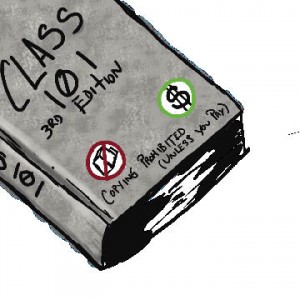Surviving without Access Copyright
BAJ Visser
The Reflector
It happened without much fanfare, but the way Mount Royal University students and faculty access copyrighted material changed drastically this September.
MRU opted out of the Canada-wide Access Copyright program on Sept. 1, in protest over proposed changes to the tariff handling copyrighted materials.
“There are enough issues in the proposed tariff that we as a university could not comply with it,” said Rebecca Cleaver, MRU’s first-ever copyright adviser.

Part of the proposal MRU rejected was a fee hike from $3.88 to $45 per student. Illustration: Troy Kirkland
Previously, MRU students and faculty would use or copy materials that Access Copyright had acquired rights to. Access Copyright acts as a copyright collective, working with copyright holders on behalf of its subscribers.
That changed when the Canadian Copyright Licensing Agency proposed a number of the changes to Access Copyright, including: stricter auditing requirements, monthly usage reports, changes to the definition of course materials to include links and Internet artifacts and access to secure network files including emails.
“This was a huge privacy concern for us as well as a number of other schools,” Cleaver said.
Also among the proposed changes is a $45 per student fee, up from $3.88 per student, something Cleaver said would have cost MRU a quarter-million dollars each year.
“There was also an issue about being double-charged,” Cleaver said, adding that the new agreement failed to take exemptions in the copyright act into consideration, works that the MRU library subscribes to, and works by the course professors themselves.
As a result, MRU is going it alone, using numerous tactics so students and staff can continue accessing works they need for assignments and lectures.
Materials found in books and literature the library owns or subscribes to are fair game.
“Much of the library’s collection budget goes to securing electronic resources for the institution, so we want to make it known to students and staff that these materials are here for them to use,” Cleaver said.
Professors and students can also turn to open-access materials, or materials covered under the Creative Commons policy. Many of these online or public domain works are free to use in non-commercial circumstances including education.
Professors and librarians are also working out transactional licenses with various license holders. Cleaver said it takes more effort on the faculty’s part, but many of the holders are open to such agreements with universities.
Finally there are uses that fall under the exceptions in the Canadian Copyright Act. Cleaver said the projection of copyrighted materials onto a screen, using such materials in exams, and fair dealing can allow students and staff to use otherwise restricted pieces in class.
This is the first semester MRU is going without access to Access Copyright, and so far the Students’ Association of Mount Royal University’s VP academic Jennifer Langille hasn’t heard any problems.
“We’re able to cut out the middle-man, meaning we can save some money for students,” she said.“I think that is the most important consideration for the school, that by opting out we can save students and the school a huge amount of money.”
Cleaver created an online guide for students interested in learning more about copyright and copyright compliance at libguides.mtroyal.ca/copyright


